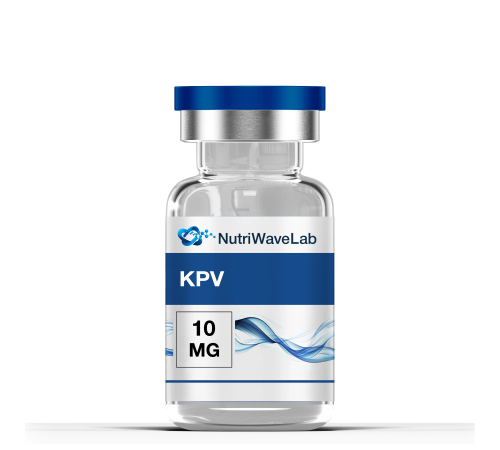
KPV is a tripeptide consisting of the amino acids lysine, proline, and valine, and it is derived from the hormone alpha-melanocyte-stimulating hormone (α-MSH). In recent years, KPV has attracted the attention of researchers due to its powerful anti-inflammatory and antimicrobial properties. It is being studied in the context of treating various inflammatory conditions, improving skin and gut health, and assisting in autoimmune disorders such as psoriasis.
Anti-inflammatory properties of KPV
One of the most important qualities of KPV is its ability to significantly reduce inflammation. It affects key inflammatory pathways, thereby reducing the number of inflammatory white blood cells in the body. Research has shown that KPV blocks the action of interleukin-1β, a powerful mediator of inflammation that is involved in the development of many chronic diseases. Additionally, KPV differs from other peptides in the MSH family because it does not rely on melanocortin receptors, indicating a unique mechanism of action. Its ability to suppress NFκB signaling, a major player in inflammatory reactions, also opens the door for its potential use in treating conditions such as asthma.
Antimicrobial properties of KPV
KPV also exhibits strong antimicrobial properties. Studies have shown that it is effective in fighting bacterial infections, including dangerous strains like Staphylococcus aureus, by disrupting their cellular membranes. Importantly, KPV is also active against fungi, such as Candida species, making it a promising treatment for both bacterial and fungal infections. Another significant feature of KPV is its ability to break down biofilms formed by microbial communities, which are often resistant to antibiotics. This makes KPV a potential candidate for treating persistent infections that are difficult to address with standard therapies.
Skin health and wound healing properties
Animal studies have shown that KPV promotes rapid wound healing by reducing inflammation at the site of tissue damage. This is crucial for tissue recovery after injuries or surgeries. In the future, KPV may be used to improve outcomes in cosmetic procedures, such as laser skin treatments, by helping to reduce scarring and improve skin texture. In vitro studies also show that KPV stimulates the growth of cells like fibroblasts and keratinocytes, which play key roles in wound healing and skin regeneration. Additionally, it regulates important growth factors necessary for skin repair and renewal.
Gut health and Inflammatory Bowel Disease (IBD)
KPV has proven effective in reducing inflammation and symptoms associated with inflammatory bowel diseases, such as colitis. It decreases the infiltration of inflammatory cells into gut tissues and reduces the production of inflammatory cytokines, helping to restore the gut lining. Research suggests that this peptide could be administered orally to treat inflammatory bowel diseases, making it convenient and safe for long-term use.
Prevention of colitis-associated cancer
Chronic inflammation, especially in the gut, can lead to the development of cancer. Due to its powerful anti-inflammatory properties, KPV may potentially prevent or slow down the progression of cancer in people with chronic colitis. Its ability to improve the cellular environment in the colon makes it a promising tool in preventing colorectal cancer in patients with inflammatory bowel diseases.
In conclusion, KPV offers a wide range of beneficial effects, from combating inflammation and infections to improving skin and gut health. It can also serve as a safer alternative to steroid treatments for conditions like psoriasis, as it directly targets inflammatory processes in cells without causing the typical side effects associated with steroid therapy.
KPV Peptide Overview
Molecular Formula: C16H30N4O4
Molecular Weight: 342.43 g/mol
PubChem CID: 125672
Synonyms: Lys-pro-val, L-Valine, N-(1-L-lysyl-L-prolyl)-, Msh (11-13)
_______________________________________________________________________________________________________________________________________________________________________________
Research Applications:
Anti-Inflammatory: Reduces chronic
inflammation and supports treatment of inflammatory conditions.
Antimicrobial: Effective against bacterial and fungal infections, disrupts microbial biofilms.
Skin and Wound Healing: Enhances tissue
repair and improves skin health.
Gut Health: Alleviates symptoms of inflammatory bowel disease (IBD) and supports gut lining repair.
Product Use: THIS PRODUCT IS STRICTLY FOR
SCIENTIFIC RESEARCH PURPOSES ONLY. It should only be used in laboratory
settings. All product information on this website is provided solely for
educational purposes. The law strictly prohibits introducing this product into
the body of humans or animals. Only licensed professionals should handle this
product. This product is not a drug, food, or cosmetic and should not be
improperly classified or used as such.
There are no reviews for this product.
No questions about this product.
